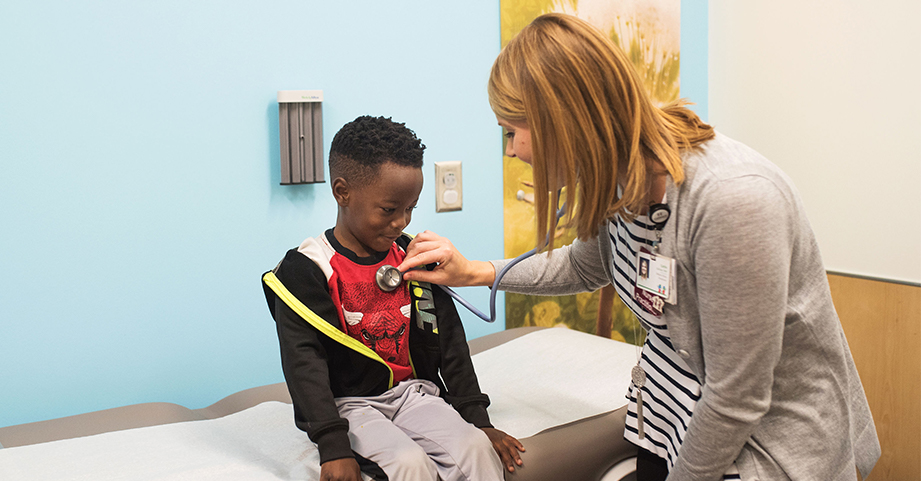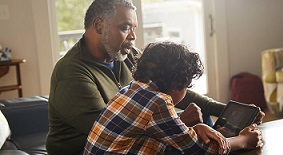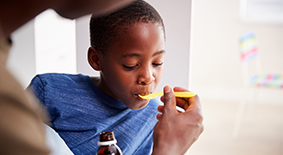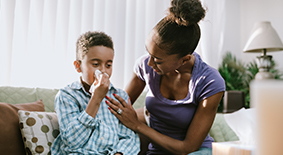Key Coughs Parents Should Know
Reviewed 3/21/2024
Do you know the difference between a wet cough and whooping cough? Learn the difference between common children’s coughs and which types require a trip to the doctor.
A child’s cough can sound terrible—and some may require a trip to the doctor—but most aren’t a sign of something serious. In fact, coughing is a symptom, not an illness.
“Coughing actually helps your child clear mucus from the airway,” says Tracy Nailor, MD, MPH, a Pediatric Urgent Care Physician at Children’s Healthcare of Atlanta. “We only worry about coughs if the child also has a high fever or trouble breathing.”
Use this quick guide to help distinguish between some common coughs in kids, get tips on how to treat them and learn when to call your child’s pediatrician.

It can be scary to hear your child coughing, but it’s important to know that there are different types of coughs, and most are not a sign of a serious problem. Here’s how to tell them apart:
What is a dry cough?
A dry cough doesn’t produce much mucus and often accompanies a viral respiratory infection like a cold or the flu. A cough with a sore throat, headache or runny nose without fever is likely just a cold and simply needs to run its course. Be aware that these infections can last for several weeks, especially if a child has one cold after another.
What is a wet cough?
A wet cough is a moist cough that comes from the chest and often produces mucus or phlegm that’s white, yellow or green. It may or may not be the sign of a bacterial infection. A long-lasting wet cough can lead to a serious chest infection. So if your child has a wet cough, it’s best to go ahead and call your pediatrician.
If the cough is from a bacterial infection, your doctor may prescribe antibiotics. If the cough is caused by a virus, your child will require some rest and fluids while the illness runs its course.
What is a croup cough?
If your child’s cough sounds like a hoarse or raspy bark, he probably has croup. Croup is a viral infection of the upper airway that commonly appears in kids 6 months to 3 years of age, although older children can also get it. The sound of the cough is from the swelling around the vocal cords from the virus.
Croup typically starts with cold symptoms, and the cough tends to start suddenly. Most kids with croup also have stridor, a high-pitched or squeaking noise when breathing in. You may notice rapid breathing or the chest “sucking in” when your child breathes in and out. This can be a sign your child is having trouble breathing.
Most cases of croup are mild and can be treated at home. But if you’re concerned your child’s croup is not improving, or if your child is drooling a lot or seems to have difficulty breathing, call your doctor or emergency services, even if in the middle of the night.
Here’s what to look for in spotting more serious coughs:
What is whooping cough?
Whooping cough, also called pertussis, is a serious bacterial infection of the airways. Whooping cough starts out sounding like an ordinary cold but gradually becomes worse, especially at night, causing back-to-back coughing fits in children. After coughing, your child may breathe in deeply, making a whooping sound.
Whooping cough is most severe in children less than 6 months old who aren’t yet protected by immunizations, as well as in kids 11 to 18 years old whose immunity has started to fade. The DTaP (diphtheria, tetanus and acellular pertussis) vaccine series helps prevent whooping cough.
Call your doctor right away if you suspect whooping cough. It usually requires antibiotic treatment, and some kids may need to be treated in a hospital.
What is a wheezing cough?
If your child makes a wheezing or whistling sound when breathing out, this is most likely due to a problem in the lower airways of the lungs. Mucus and inflammation of the lower airways due to viral infection or asthma triggers cause narrowing and spasms of the lower airways resulting in wheezing. Wheezing may also occur if the lower airway is blocked by a foreign object.
There are special medicines necessary to help the lower airways function properly in the case of an infection or asthma, so a wheezing cough should be examined by a doctor.
What if my kid vomits while coughing?
Kids can cough so much that they throw up. Vomiting can also be caused by mucus that drains into the stomach. Don’t be alarmed about this unless the vomiting doesn’t stop or is accompanied by a high fever.
If your child is vomiting, it’s important to be on the lookout for signs of dehydration, such as decreased urine output, dry or sticky mouth, doughy or cool skin, irritability, or sluggishness. Make sure your child is getting plenty of rest and staying hydrated with water, low-sugar fruit juices or ice pops.
The good news is that usually a cough is simply the way your child’s body is processing an illness—but there are some times when you should seek medical care.
Call your pediatrician if:
- Your child has a persistent daily cough that lasts more than four weeks.
- Your child has a cough combined with fast breathing.
- Your child has a high fever, especially if he’s coughing but does not have a runny or stuffy nose.
- Your child can’t speak normally because of coughing.
- Your infant (3 months or younger) has been coughing for more than a few hours.
- Your child is dehydrated—signs include dizziness, drowsiness, dry mouth, sunken eyes, crying with little or no tears, urinating less often, or having fewer wet diapers.
If your child is turning a dusty blue color, having trouble breathing or experiencing respiratory distress due to asthma, this is an emergency. Your child should be evaluated immediately or taken to the nearest pediatric emergency department.
Call 911 if:
- Your newborn is breathing irregularly.
- The area around your child’s mouth is turning blue.
- Your child has stopped breathing.
If you’re considering giving your child over-the-counter cough medicine, review these medication tips to help you make sure you’re giving your little one medicine safely and accurately. And remember, children under 6 years old should not be given cough medicine.
Here are a few simple remedies you can try at home to help comfort your child until the cough is gone.
Helping You Navigate Common Childhood Illnesses
This content is general information and is not specific medical advice. Always consult with a doctor or healthcare provider if you have any questions or concerns about the health of a child. In case of an urgent concern or emergency, call 911 or go to the nearest emergency department right away. Some physicians and affiliated healthcare professionals on the Children’s Healthcare of Atlanta team are independent providers and are not our employees.
Contact Us 404-785-KIDS (5437)





